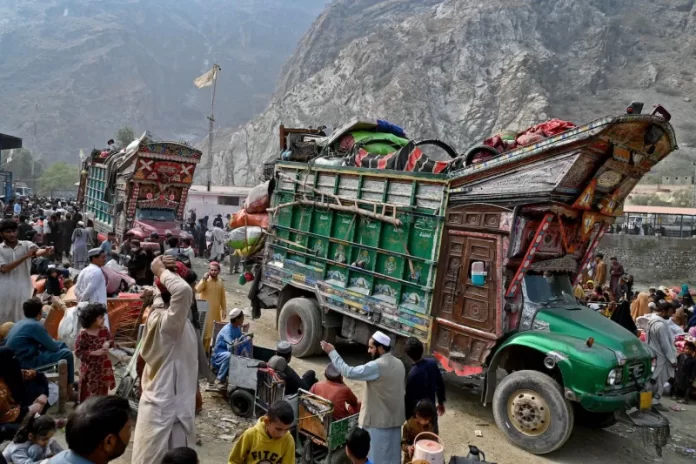Before critiquing and contextualizing the current abrupt drive against “undocumented Afghans” – decried by many at home and abroad as inhuman and immoral – let me recall a recent related anecdote.
Recently, during a visit to Fatehjang, part of Rawalpindi, we stumbled upon three Qingjee drivers. They all were young Afghans.
The local land revenue officials told us about the presence of thousands of Afghans in Fatehjang and areas beyond it, something I had seen several years ago while mapping areas with Afghan population. Sargodha, Faisalabad, Sialkot, Kasur inter alia housed scores of Afghan families busy in cottage industry as well as agriculture.
The same is the case in the Tarnol, Fatehjang and other outskirts of Rawalpindi as well Bani Gala and Bhara Kahu areas of Islamabad, or in much of Khyber Pakhtunkhwa and Balochistan.
Let us first put basic figures in perspective; currently, Pakistan hosts nearly 1.4 million Afghan refugees with Proof of Registration (PoR) cards, allowing them to reside in the country legally. An additional 800,000 possess the Afghan Citizen Card (ACC) – issued based on a government-International Organization for Migration agreement. Following the return of the Taliban to power in August 2021 at least 700,000 Afghans took shelter in Pakistan. Some 200,000 of them have since relocated to the United States and other Western countries.
The rest of them, along with an estimated 1.1 million other Afghans, are the subject of the crackdown on foreigners who possess no documents or are overstaying their visas. Many of the Afghans who crossed into Pakistan used a hand-written identity card or ‘tazkira”.
Nearly 60 percent of the documented Afghans were born here. Lots of them have acquired Pakistani ID cards or – even passports as evident from the 12000 passports recovered from Afghans working in Saudi Arabian officials informed Pakistan about. This is just the tip of the iceberg it seems. Officials of the Ministry of Interior and NADRA in various cities have been making money off such Afghans for issuing ID cards.
The point I want to underline is the readiness (weakness within) of our officials to issue fake IDs for personal gratification. The greater onus rests on these officials and not on Afghans or any other aliens in possession of Pakistani IDs.
Now, the Sindh government has raised alarm over the “demographic security threat “ that the Afghans pose to the province. Again a self-serving myopic argument.
Migration changes demographics the world over. It is seen as an enrichment and reinforcement of the economy rather than a threat. In our case, Pashtoons and Afghans, for instance, perform the hardest of jobs in Karachi and elsewhere. They work in nearly all heavy construction sectors. This way they are an important part of local economies and not a burden.
No surprise that many economists caution that the deportation campaign could harm even the already fragile economies of Balochistan and Khyber Pakhtunkhwa.
Now to the phony argument on the causes of terrorism in Pakistan this year. Caretaker PM Anwarul Haq Kakar’s implied allegation that violence in Pakistan was linked to the presence of Afghans in Pakistan really smacked the typical, traditional attitude of denial and scapegoating.
Just pointing to a couple of dozen Afghans being involved in terrorist attacks hardly reflects logic. We should not forget that scores of Pakistanis were killed, arrested and handed over to Pakistan during the two decades of war on terror in Afghanistan. Most of them belonged to various militant factions who used to send fighters to augment the Afghan Taliban. But did that mean that these Pakistanis were responsible for the widespread violence across Afghanistan, or in any the cardinal force behind the Taliban-led insurgency? Certainly not.
Former president Hamid Karzai made a similar reference when I met him in Hamid Karzai Kabul in August this year; we had a similar complaint, we arrested, killed and identified scores of Pakistanis who had been part of the Taliban insurgency for nearly two decades, he pointed when the issue of a few Afghan killed in counter-terror operations in Pakistan came up.
“The TTP, JUI-, JI had publicly been also supporting and providing manpower to the Afghan Taliban – as much as they did during the anti-Soviet Russian jihad, “ he said. All we said then was to stop them as much as possible from becoming helping hands of the Afghan Taliban.
Now regardless of the polemics, let us acknowledge that regulation of foreigners is unavoidable for effective controls. Yet it has to be thought-through and well-sequenced to avoid harm to anyone.
Secondly, Afghans – undocumented – should have been given a reasonable deadline to register instead of forcing them into a country that is struggling economically. This also has given the police a carte blanch for harassment and extraction off Afghans.
Thirdly, terrorism in Pakistan is essentially proxy in nature, externally driven, not by the Afghan Emirate. We must not dump the entire blame on Kabul alone for what happens in Pakistan, the way we argued when Karzai and Ghani would point fingers at Islamabad for their troubles.
Fourth, the Emirate is responsible for taming and neutralizing terrorist groups sheltering in Afghanistan. It is expected to walk the talk on counter-terrorism instead of ducking under excuses of Muslim fraternity and tribal traditions.
Both countries need to anchor their relationship in law and regulation, instead of harping on practically obsolete notions such as but immaterial “ cultural, linguistic, ethnic” bonds which may have been useful for a fictional “caliphate” but not for present-day inter-state relations.




